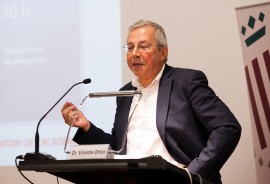- Fecha(s): 02/11/2015
- Lugar: Sala de Seminarios, Edificio Torretamarit, UMH. No se retransmitirá en directo, pero se grabará.
- Ponente: Vito Fragnelli, Università del Piemonte Orientale

Abstract Several power indices were introduced in order to account for different aspects of decisional situations. The talk presents how to deal with those situations, commonly arising in politics, in which the agents have some incompatibilities. Some comments on existing power indices and how communication structures and restricted games may allow a better evaluation of…
- Fecha(s): 30/10/2015
- Lugar: Seminario del Departamento de Métodos Cuantitativos para la Economía y Empresa, UMU. Se retransmitirá en directo.
- Ponente: María Isabel González-Martínez, Universidad de Murcia

Abstract Following the ideas of the Tourism Area Life Cycle (TALC) theory, we propose a dynamic econometric model for tourism demand where the reputation effect (the effect of the lagged demand on the current tourism demand) is not constant, but dependent on congestion. We test the model using panel data from Spanish regions during the…
- Fecha(s): 23/10/2015
- Lugar: Seminario Martínez Gallur, Facultad de Economía y Empresa. Se retransmitirá en directo
- Ponente: Marta Solaz, Universidad de Valencia

Abstract Siguiendo la metodología propuesta por Koopman, Wang y Wei (2014) y a partir del banco de datos generado en base a las tablas input-output internacionales de la World Input-Output Database (WIOD), el trabajo analiza la integración de la economía española y sus distintos sectores en las cadenas globales de valor (CGV) a lo largo…
- Fecha(s): 03/07/2015
- Lugar: Seminario Martínez Gallur, Facultad de Economía y Empresa. Se retransmitirá en directo.
- Ponente: Timothy J. Kehoe, University of Minnesota y Federal Reserve Bank of Minneapolis, USA. Pau Pujolas, McMaster University, Canada.

Abstract Recent research in international trade simultaneously has developed along two branches. Empirical research measures plants’ productivity and shows that exporters are more productive than non-exporters. Theoretical research develops models of heterogeneous firms and shows that exporters are more efficient than non-exporters. We argue that there is a disconnect: the measure of firm productivity used…
- Fecha(s): 08/06/2015
- Lugar: Sala Seminarios, CIO, Edificio Torretamarit, Universidad Miguel Hernández de Elche. No se podrá retransmitir en directo. Los interesados que puedan hacerlo deberán acudir a la UMH.
- Ponente: Nizar Allouch, Queen Mary, University of London

Abstract This paper studies the interbank liquidity game where banks are located on a network and may access their direct neighbors’ liquidity holdings. We investigate patterns and directions of welfare-improving transfers in arbitrary networks. More specifically, we use a geometric approach to characterise two general cases – where the welfare improvement is accompanied by a…
- Fecha(s): 03/06/2015
- Lugar: Seminario del Departamento de Métodos Cuantitativos para la Economía y Empresa, UMU. Se retransmitirá en directo.
- Ponente: Vicente Ortún Rubio, Universidad Pompeu Fabra.

Abstract En este seminario se abordan cuestiones relacionadas con la medida de la calidad en la gestión y su relación con los incentivos a niveles institucional, organizativo e individual. Se expondrán algunas de las preguntas relevantes que, con particular énfasis en el ámbito de la sanidad, todavía esperan respuesta.
- Fecha(s): 28/05/2015
- Lugar: Seminario del Departamento de Métodos Cuantitativos para la Economía y Empresa, UMU. Se retransmitirá en directo. Se mantendrá una reunión con los alumnos interesados.
- Ponente: María Pilar Martínez García, Universidad de Murcia

Abstract This paper analyzes an Ak-type endogenous growth model under non-constant discounting, assuming both naïve and sophisticated consumers. For both types of consumers an isoelastic utility with an intertemporal elasticity below one guarantees observational equivalence under exponential and non-constant discounting, but rejects strong equivalence (identical overall impatience does not lead to identical growth rates). Further,…
- Fecha(s): 21/05/2015
- Lugar: Seminario Martínez Gallur, Facultad de Economía y Empresa, UMU. Se retransmitirá en directo.
- Ponente: Marta Solaz (Universidad de Valencia)

Abstract According to the product life-cycle theory, new products are invented and developed in the advanced economies, from which they are initially exported. At a later stage, part or all of their production process moves to lower-wage countries. These dynamics lead to a continuous process of international relocation of production. In this paper, we use…
- Fecha(s): 14/05/2015
- Lugar: Seminario del Departamento de Métodos Cuantitativos para la Economía y Empresa, UMU. Se retransmitirá en directo. Se mantendrá una reunión con los alumnos interesados.
- Ponente: Aleix Calveras Maristany, Universidad Islas Baleares.

Abstract We study both theoretically and empirically the relationship between different types of corporate social responsibility (CSR) and a firm’s product quality. On the one hand, observable external CSR (e.g., a firm’s involvement in a social project) can be used as a signal to unobservable product quality. On the other hand, internal CSR (e.g., human…
- Fecha(s): 29/04/2015
- Lugar: Seminario del Departamento de Métodos Cuantitativos para la Economía y Empresa, UMU. Se retransmitirá en directo. Se mantendrá una reunión con los alumnos interesados.
- Ponente: Rafael Caballero Fernández, Universidad de Málaga

Abstract Deseamos exponer mediante un breve recorrido a través de algunos trabajos en ese ámbito algunas de nuestras experiencias, carencias, aprendizajes y retos conseguidos o inconclusos. Es claro que el problema es multi,… multidimensional, multivariante, multicriterio. Expondremos como distintas cuestiones conceptuales marcan líneas metodológicas distintas pasando por el Análisis Multivariante, Análisis Envolvente de Datos y…











